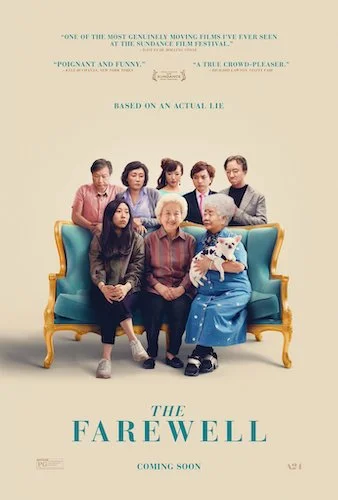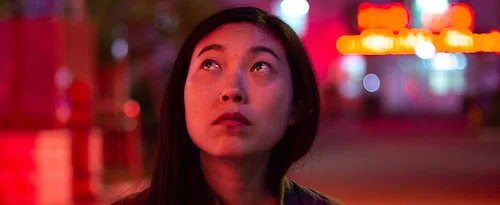The Farewell
The credits began to roll, and I wondered if the final seconds of Lulu Wang’s The Farewell affected the entire whole in a bad way. I then thought back on the experience of the film, and determined that it had not. Did I have to recollect the entire feature? Sure. I needed to make up my mind on the worth of it all. It actually slowly began to strengthen Billi’s journey the entire time, because we realize all was not vain. The Farewell is a title that represents the news that Billi’s grandmother is going to die, but it also showcases the waving off of ignoring one’s culture. Billi lives in New York, and was convinced by her parents to focus on her goals there, while her family back home disappeared one by one. Houses were sold. Cities changed. Her identity was being dismantled. As a millennial growing up in a hyper connected America, Billi begins to harken on the traits that make her Chinese.
Grandmother Nai Nai is not told she has mere weeks to live. Her family suggest that she will enjoy her last moments alive without being burdened by fear. Her grandson is getting married to his Japanese girlfriend of three months as an excuse to get the family back to China to say their hidden goodbyes. Is getting married for loaded reasons the shattering of traditions? Wang’s latest feature cleverly pits ideals together, making us wonder what is acceptable and what is not. We even have family members realizing they, too, were lied to for their own benefit. Where is the line drawn? This is why the premise is so messy and yet so juicy. Every instance is a subjective argument. No one likes being lied to, unless they don’t know they are being lied to. Is deception worth it?
Billi and her family facing Nai Nai, best suppressing their emotions.
Billi is in the middle of a true conundrum. She is told lying to the dearly departed is a cultural custom, yet she feels she has had to lie to herself about her roots for most of her life. She is an American who happens to be Chinese, and she is happy where she is (so she sells). Rent is a nightmare. She didn’t get accepted to the writing fellowship she fought for. She has to embrace this, right? Because her family immigrated here for her well being? Well, the lack of a clear picture makes The Farewell a bit of a unique experience. There are awkward films, but it doesn’t nuzzle itself into being a cringe comedy per se. It focuses on its familial beauty, and it’s kind of refreshing. Here’s a tough conversation not being completely melodramatic or silly about the topic.
Part of the film’s warmth comes from Awkwafina, who turns in a career sparking performance that currently looks like a worthwhile awards season mention. Her take on Billi has the rare outburst, but most of her sorrow is held within to the point of bursting. Her comedic chops play a bit here, too, but in no way is she the confident, snappy character she usually is. She takes this leading role head on, with enough of her hilarity to at least inspire a slight chuckle, and enough relatable misery to well up your eyes. Can we please have more lead Awkwafina roles? The fact that this stellar work only seems like the tip of the iceberg leads me to believe that we have a showstopper in our midst.
Awkwafina’s leading work in The Farewell is a highlight in 2019’s cinematic realm.
Of course, Wang’s personal connection to this story (of which she also wrote) helps inspire something special with the material. Everything is treated tenderly: the humanistic goofs, and the wallowing in depression. Images are usually stoic, representing photographs and portraits. These are the final moments, if they could all be captured. What is the single moment we cling onto the most when we deal with loss, especially when we plan our final visit? Is it the very last second? Is it the blur when we forgot why we were truly here? Is it the acknowledgement somewhere in between, where we make the moment truly count? The Farewell isn’t quite sure, but that makes the entire trek all count.
Which, once again relates me back to the ending (don’t worry, no spoilers here). We have an abolishment of public standards on one’s identity, the welcoming of heritage, and the confirmation of permanence through a bloodline. Then we get the very last image. Where do we go from here? Well, we can rewatch the film with a whole new light, perhaps one that makes the whole thing even funnier. This is the extent humans go to, and it’s all hilarious when you really think about it. Is the film worthless? Absolutely not. It’s the championing of life through the debate of what causes of action are the most appropriate. At the end of the day, everyone had the soon-to-be departed’s best interests at heart. That matters.
Billi and her family saving face while in public.
Many moments of The Farewell got to me emotionally, because it is so genuine in nature. You may start off thinking some decisions are completely immoral, and yet you may start to notice the value in these ideas later on. You may end off not knowing where you stand, and that’s fine. No one really knows how to deal with death, so it can easily be a hot button issue. Wang composes this delicate crisis with grace, familiarity, modern relevance, and care. This could have been a slapdash comedic scandal. This could have been a hyper depressing expulsion of feelings. We got The Farewell: a grey area that has no distinctive, perfect label, and it’s just the perfect trait a film of its nature can have.
Andreas Babiolakis has a Masters degree in Film and Photography Preservation and Collections management from Ryerson University, as well as a Bachelors degree in Cinema Studies from York University. His favourite times of year are the Criterion Collection flash sales and the annual Toronto International Film Festival.








